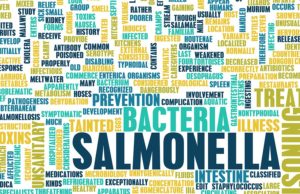Checklist On How to Prevent Food Poisoning at Home
January 19, 2018
As a family caregiver to your aging mom or dad, one of your responsibilities may be to prepare and cook meals for them. Hopefully, you’ve established good habits of cleanliness in the kitchen and know all about foodborne illnesses because food poisoning is a serious issue with the elderly. Even if you or an elder care aide are coming in occasionally to help your elderly parents tidy up, you need to make sure they are being safe and responsible when they are cooking in the kitchen.

Bacterial food poisoning is a hassle for average adults, but it can be very serious or even fatal in elderly people. Because their immune systems are not as strong, their bodies have a harder time reacting to and repelling bacteria. Poor food preparation and unsanitary handling are the most common ways that foodborne illnesses are contracted.
Here is a checklist of steps that you and others can take to minimize the risk of bacterial food poisoning:
-Always wash hands with warm water and soap before handling food or kitchen utensils.
-Wash kitchen items like cutting boards, countertops, knives and more after using them.
-Sanitize surfaces with a commercial cleaner or bleach cleanser.
-Use paper towels because they are more sanitary in the kitchen for spills than dishcloths.
-Fruits and vegetables should always be washed in running tap water, even those with skins and rind.
-Wipe down the lids of canned goods before opening so the mechanism doesn’t push bacteria into the food inside.
-Never put food on any surface that had raw meat on it, such as the counter, plate or cutting board.
-Always use a food thermometer to ensure foods are safely cooked to the proper internal temperature. For example, poultry should be cooked to 165 degrees Fahrenheit and beef should be cooked to 145 degrees Fahrenheit.
-Don’t serve undercooked eggs to seniors because of the risk for food poisoning. Eggs should always be cooked until the white is firm and the yolk is solid.
-When reheating food in the microwave, always cover it, stir it halfway and rotate it to ensure even heating. Check the internal temperatures before serving.
-Avoid leaving food out for too long at room temperature. Instead, refrigerate leftovers immediately because cold temperatures slow down the growth of bacteria.
-Ensure the refrigerator is kept at 40 degrees Fahrenheit or lower and the freezer should be set at 0 degrees Fahrenheit.
-Don’t thaw out frozen food at room temperature. Instead of the counter, thaw food in the refrigerator or in the microwave.
Even the best efforts in food preparation and storage can result in a foodborne illness. If you, another family member or an elder care aides notice symptoms like diarrhea, fever, nausea, and vomiting in an elderly adult, you should save the packaging material and any food that the elderly person was eating, and get to a doctor. Food poisoning isn’t a good thing for people of any age, but for the elderly, it can be a very serious illness that can lead to further health issues. Preventing food poisoning is the best thing you can do to keep your aging loved one safe and healthy.